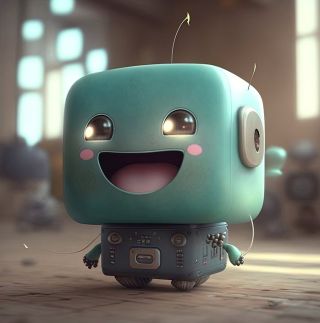Artificial Intelligence
Will AI Robots Coach Mental Well-Being in the Workplace?
A study tests AI-powered robots' ability to coach wellness in the workplace.
Posted March 20, 2023 Reviewed by Ekua Hagan
Key points
- The United Nations estimates that almost one billion people globally suffer from some form of mental disorder.
- Eighty-four percent of U.S. workers reported in one survey that at least one workplace factor had a negative impact on their mental health.
- When testing AI robots as well-being coaches, researchers found participants perceived a toy-like robot more positively than a humanoid one.

Employee well-being in the workplace is essential for overall company health. Can robots enabled by artificial intelligence (AI) serve as effective mental well-being coaches in the workplace? A first-of-its-kind study by University of Cambridge researchers shows that appearances make a difference in how AI-powered robots are perceived as mental well-being coaches in the workplace.
“Our study provides valuable insights for robotic well-being coach design and deployment, and contributes to the vision of taking robotic coaches into the real world,” wrote the University of Cambridge research team of Micol Spitale, Minja Axelsson, and Hatice Gunes, who presented the findings at HRI '23: Proceedings of the 2023 ACM/IEEE International Conference on Human-Robot Interaction in Stockholm, Sweden.
Mental Health in the Workplace: Globally and in America
The United Nations estimates that almost one billion people globally suffer from some form of mental disorder. Mental health impacts global productivity. Anxiety and depression cost the worldwide economy roughly a trillion dollars yearly, mainly due to lost productivity and an estimated 15 percent of working-age adults have a mental disorder at any point in time according to the World Health Organization (WHO).
In the U.S., mental health support is an important consideration for American workers. According to the U.S. Surgeon General Framework On Workplace Mental Health 2022 report, over 75 percent of those surveyed reported at least one symptom of a mental health condition, and 84 percent surveyed reported at least one workplace factor that had a negative impact on their mental health. Over 80 percent of U.S. workers surveyed by the American Psychological Association (APA) responded that how employers support mental health will be an important consideration for them when they look for future work according to the American Psychological Association 2022 Work and Well-Being Survey.
The APA forecasts a shortage in the number of U.S. psychiatrists. An estimated 55 percent of the total psychiatrist U.S. workforce is expected to retire within the decade and twice as many psychiatrists are leaving rather than joining the workforce. APA predicts that this workforce contraction will continue through next year.
AI-Powered Robots as Mental Well-Being Coaches
“In this paper, we present the first study that investigates the deployment and use of two forms of robotic mental well-being coaches in the workplace,” the researchers wrote.
How effective can robots be as mental well-being coaches? The researchers tested two types of AI-powered robots for the study: the QTrobot and the Misty II robot.
“We chose those robots because they are both equipped with a face screen and we could control facial appearance across the forms, e.g., facial expressions, lip-sync, etc. Additionally, the robots are smaller, making them portable in a workplace environment, and affordable, making them a realistic investment for a workplace to purchase and use,” wrote the scientists.
University of Luxembourg spinout LuxAI S.A. is the maker of the QTrobot, an expressive social robot that provides a platform for Human-AI research, as well as an assistive tool for children with autism spectrum disorder (ASD or autism) at home or at school. LuxAI S.A. was co-founded in 2016 by Pouyan Ziafati and Aida Nazarikhorram, according to Crunchbase. LuxAI S.A. is currently hosting a competition for embodied and emotional voice interaction with QTrobot and OpenAI’s ChatGPT. The QTrobot is a table-top child-like robot that is 90 cm tall.
Misty Robotics, Inc., formerly NewCo Robotics and the maker of the Misty II robot, was founded by Ian Bernstein in 2017 by a team from Sphero. In addition to crowdfunding, Misty Robotics' investments came from Venrock, Techstars, Foundry Group, Great North Ventures, and Techstars Ventures, according to Crunchbase. Last year, the company was acquired by Furhat Robotics, a Swedish company. The current version is the Misty II, which is powered by an AI deep-learning processor that provides a wide range of AI machine-learning activities including touch sensing, sound sensing, facial and object recognition, spatial mapping, and distance detecting. The Misty II is a toy-like robot that is 36 cm tall.
To conduct the study, the researchers had the robots deliver a positive psychology exercise once a week for four weeks. These scripted positive psychology exercises were developed in collaboration with a well-being professional human coach and included exercises for savoring, gratitude, accomplishments, and future optimism. The study participants were employees of Cambridge Consultants, Inc. The behaviors and personalities were designed to be identical for both robots.
“Our results show that the robot form significantly impacts coachees’ perceptions of the robotic coach in the workplace,” the researchers reported.
The study participants perceived the more toy-like robot, Misty II, more positively than the more humanoid robot form factor. This be due to lower expectations for a more toy-like robot, the researchers suggest.
Interestingly, the study showed that the participants' mental well-being did not improve during the one-month study period. The researchers hypothesize that this may be due to the relatively high level of mental well-being of the study participants and the short duration of the study. Notwithstanding, as a first-of-its-kind study, the Cambridge University researchers highlight the importance of the form factor in human-robot interaction and pave the way for future research to support human well-being in the workplace.
Copyright © 2023 Cami Rosso All rights reserved.




